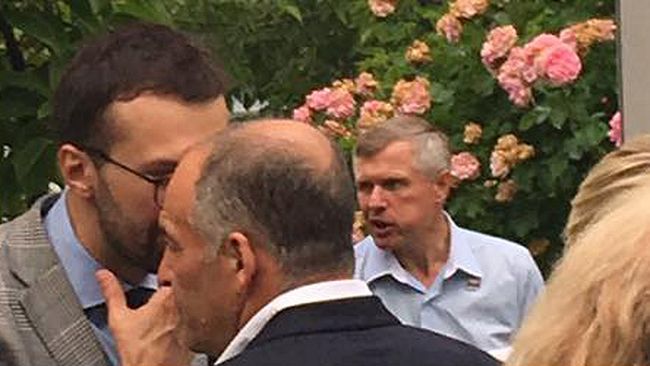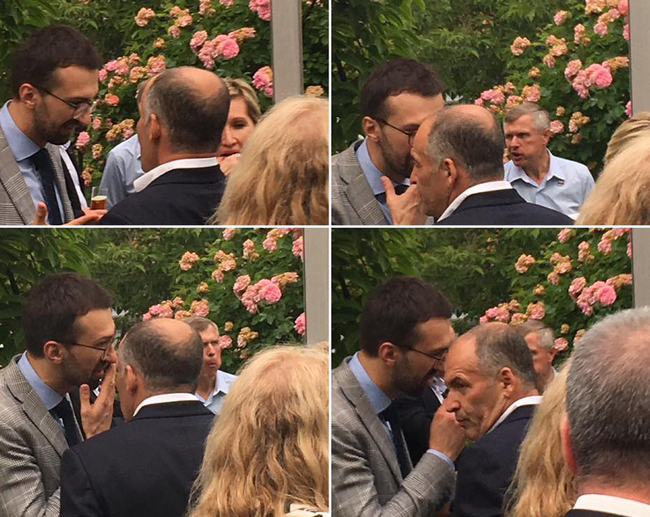“Collective Duranty”
Photo album of unscrupulousness has new addition: a photo of Viktor Pinchuk and Serhii Leshchenko whispering to each other
“Whitewashing Crime Instigators: How Politicians and Journalists Distorted Reality” is the title of a section of Den/The Day’s new book, called “The Trap,” or A Case without a Statute of Limitations. This collection of essays on the recent history of Ukraine deals with the responsibility of the journalist community for the nation’s distorted system of moral coordinates, using, in particular, the example of the high-profile Gongadze-Podolsky case. Journalists ought to do their best to bring to justice those guilty of the murder of their colleague Georgy Gongadze and beating of civic activist Oleksii Podolsky. However... Instigators of these crimes are not only still at large, but actively influencing the Ukrainian journalism and politics as well.
A recent story is emblematic in this context. Famous blogger Serhii Ivanov posted a photo on his web page which shows a scene during a reception at the British embassy held on the occasion of Her Majesty the Queen’s birthday. It features former deputy editor of Ukrainska Pravda and now MP of Petro Poroshenko’s Bloc (PPB) faction (that is, the faction of the party holding the presidency) Serhii Leshchenko and Ukrainian oligarch, son-in-law of ex-president Leonid Kuchma, Viktor Pinchuk, whispering among themselves in a relaxed atmosphere. Pinchuk’s wife and Kuchma’s daughter Olena Pinchuk stands nearby.
At first glance, it would seem nothing of the ordinary. Yes, they stood together and had a talk, so what? In fact, this picture is very symbolic. Why?
Firstly, Leshchenko had long worked for Ukrainska Pravda, an online publication founded by Gongadze. Therefore, the latter’s murder case ought to be a special commitment for Ukrainska Pravda’s employees, not to mention their duty to display elementary journalistic solidarity and responsibility. “Metamorphoses of Ukrainska Pravda began 11 years ago when this publication effectively refused to cover other episodes of Kuchma’s crimes (which involved me and Podolsky), limiting itself to those related to Gongadze,” member of the Verkhovna Rada of the 2nd and 3rd convocations Oleksandr Yeliashkevych commented for The Day. He also suffered from the Kuchma regime at the time and was granted political asylum in the US due to persistent threat to his life. “Their explanation was that they supposedly concentrated on only one episode. At the same time, Ukrainska Pravda began to publish contributions which tried to discredit Mykola Melnychenko’s character. But they sent the Gongadze part of the case down the drain as well. Today I can say it openly: for various reasons, Ukrainska Pravda itself has not defended the public character of court proceedings related to Gongadze and openly ignored them. Their coverage of this trial has gradually become shaped by the Kuchma family’s spin-doctors. It also coincided with a rapprochement between the media outlet’s team and that family. Kuchma’s daughter’s interviews began to appear on the website, its journalists got their travel expenses covered when going to the family-funded events, and worse still, Ukrainska Pravda has become the official media partner of these events, and eventually a mouthpiece of the Kuchma family.”
Secondly, Leshchenko and his colleague Mustafa Nayyem were regular visitors at such famous events as the Yalta Forum or the Ukrainian Lunch in Davos, both organized by the Kuchma-Pinchuk family. And they not just covered them, but often acknowledged at the end of their contributions that their trips were sponsored by the Pinchuk Foundation. Then, once elected to the legislature, they were invited to these events as MP guests. Moreover, Nayyem, for example, was the moderator of the Ukrainian Lunch in Davos.

JUNE 16, 2016. THE EMBASSY OF THE UK IN UKRAINE
Thirdly, how exactly have journalists Leshchenko and Nayyem become MPs? One could not get on the party list of the PPB just like that. It required special patronage... Moreover, while serving in the Rada, these two MPs have long engaged in scathing criticism and displayed general disrespect for Petro Poroshenko. However, unlike Mykola Tomenko or Yehor Firsov, they have not only kept their seats, but even their places in the faction. Do these MPs really have a stronger patron than the president? Incidentally, a legislator who knows well the inner politics of the “European optimist” group in the parliament, which includes Leshchenko and Nayyem, told us about a very interesting case which involved members of this parliamentary group telling him in a whisper that they had to tone down their criticism of Pinchuk and would have to get used that their meetings with various experts or foreign guests would be attended by that particular oligarch.
Fourthly, another famous story is Ukrainska Pravda’s 2013 refusal to allow Podolsky to launch a blog on its platform. Den/The Day covered it in September issues of 2013. The crux of the story is that even notorious Ukrainophobe Vadym Kolesnichenko was allowed to blog on Ukrainska Pravda. There are legitimate differences of opinion regarding creator of the famous records from the second president’s office Melnychenko, but he has a similar story to tell: “A few years ago, Olena Prytula also denied my request to launch a blog on Ukrainska Pravda,” Melnychenko commented for The Day in 2013. “Thus, I was not surprised by the Podolsky story. I think that Prytula is not interested in seeing the case to go to the trial. Most probably, there are deeper reasons for it, some skeletons in the closet. They have failed their colleague. Unfortunately, most journalists do not do their best to get instigators of the crime punished.”
Fifthly, this writer has been covering the high-profile Gongadze-Podolsky case for a long time, and attended dozens of court hearings on the case in recent years, but has never seen “justice fighters” Leshchenko and Nayyem there.
It would seem that all these obvious things ought to be understood and supported by the journalistic community. However, as it turns out, they have prompted the opposite response from some quarters. For instance, Vakhtang Kipiani posted on Facebook the following reply to Ivanov’s posting: “I have discovered a new law of Facebook: journalists who smear Leshchenko or Yulia Mostova [I am at a loss what Mostova has to do with it. – Author] could have conducted better investigations or written better contributions, but they face a terrible shortage of time, since they spend it informing the public what they, talented and principled as they are, think of Leshchenko and Mostova.”
Well, the editor-in-chief of Istorychna Pravda [Kipiani. – Ed.] should have closely read our newspaper at very least. He would learn then that Den/The Day published the abovementioned book “The Trap” not to mention our constant coverage of the Gongadze-Podolsky case. Of course, we do not intend to stoop as low as participating in journalistic squabbles or showdowns (we prefer arguing by our work). However, the public needs key points highlighted. For example, rather than providing any specific answers during discussions in social networks, Kipiani chose to boast that he had unfriended two Den’s journalists (this writer and Valentyn Torba) because they allegedly “were spreading lies of a schizophrenic.”
Well, we can live with it. But the fact that the editor of Istorychna Pravda refers to “the surviving Gongadze” (the crime victim Podolsky, who was taken out of Kyiv and beaten (but not killed) three months before the murder of Gongadze which used a similar scenario) as a “schizophrenic” – it is very telling... Just like his hints that Podolsky (whom he unfriended later) “has long been a Russian puppet.” Do you remember the time when we were told about “American spy” Gongadze, “agent of foreign special services” Melnychenko... We saw it before, this effort to discredit victims and witnesses. This scenario benefits the crimes’ instigators, is not it? “You see? All of us, except Kuchma and Pinchuk, are enemy agents!” Elena Kuzina wrote in her comment on Podolsky’s Facebook page.
Just a month ago, we noted an exhibit from a large collection of periodicals which Kipiani put on display on his Facebook page. The exhibit in question was a 1934 issue of the newspaper Za Rubezhom, which featured Josef Stalin’s interview with New York Times’ reporter Walter Duranty, known in particular for denying the Holodomor and winning the Pulitzer Prize. We then did a page-long interview on this subject with the editor of Istorychna Pravda, in which he said, among other things, the following: “On average, the Western press operates to higher standards than we do. We should not abase ourselves or put on sackcloth and ashes over it, but should instead strive for personal journalist independence from external influences... A friend of mine from the Ukrainian diaspora, whom I interviewed on the subject, said that Duranty was totally aware that he was lying, but his personal career interests and desire to see his interview with Stalin on the front page prevailed.”
Indeed, it is hard to deny. However, the virus of “collective Duranty” seems to have openly or covertly infected some Ukrainian journalists. And if Duranty did his dirty work targeting a foreign country, his Ukrainian heirs do the same to their own. In fact, quite a few politicians and journalists made their careers by exploiting the Gongadze-Podolsky case, but eventually integrity of these “justice fighters” adapted to circumstances or even disappeared altogether.
Section
Topic of the Day





